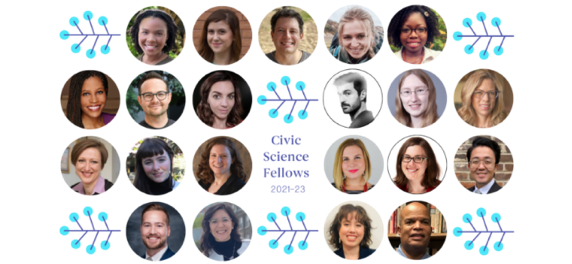The 2021 – 2023 cohort of Civic Science Fellows. EDGI’s fellows are hosted by the Rita Allen Foundation and funded in partnership with the David and Lucile Packard Foundation.
By Mark Chambers
During the past few months, EDGI’s Civic Science Fellows, Kelsey Breseman and Mark Chambers, have engaged in shared learning and collaboration with twenty other Rita Allen Fellows. We both agree that the Rita Allen Foundation has put together excellent weekly programs to help fellows get to know each others’ work, much of which is highly aligned with our own. This networking design contributes to real support for each of us as we work on our respective projects for EDGI, both of which are dedicated to supporting environmental justice communities’ use and communication of environmental data for advocacy.
Rita Allen’s weekly program includes regular guest speakers that have helped both of us advance our respective projects. For example, we had the privilege of hearing from Joyce Yen, Director of the University of Washington’s ADVANCE Center for Institutional Change, who is improving STEM by advancing people from historically underrepresented and marginalized groups. As a resource partner for the Civic Science Fellows program, Yen encourages the fellows in monthly peer coaching circles to practice active listening before jumping to offer advice and solutions. During these sessions fellows gather in small groups and each person presents a problem they are facing and identifies a next step forward. Meanwhile, the others in the circle practice not giving advice, but asking questions to help make the situation clearer. Joyce offers, “If we don’t spend enough time identifying or excavating the problem, we find a solution to the wrong problem.”
Since one of the goals of the Civic Science Fellows program is to discuss what it looks like to put communities at the heart of civic science, during a recent Tuesday workshop the fellows were introduced to Thriving Earth Exchange (TEE), facilitated by a 2020 Civic Science Fellow, Blake McGhghy, who designed a community engagement model on climate change policy in rural communities. Our TEE workshop explored how communities and scientists do science together to advance community priorities by considering ways that researchers can support bottom-up, community driven projects rather than initiating research based on their own interests and questions. To help fellows develop respectful partnerships, we were introduced to a networking and educational toolkit that matches communities with researchers and other experts with specialized skills appropriate to a community’s needs. With these new tools, Kelsey and Mark continue to work on our respective EDGI projects developing powerful data channels and narratives through which to resource EDGI’s partners in the environmental justice community.

